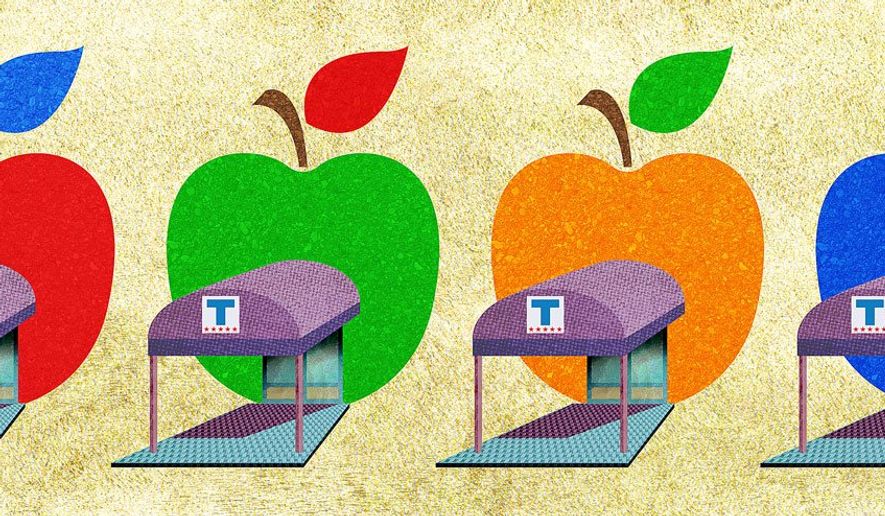OPINION:
During the 2016 presidential campaign, candidate Donald Trump spoke passionately and often about school choice. Some school choice advocates, however, are beginning to rumble about the lack of progress on this key domestic policy promise. This grumbling has been building for some time among “talking heads” in the think-tank world.
The criticism of the president is unfair and not productive.
Sure, this year several U.S. Department of Education school-choice initiatives were sent to the graveyard by congressional appropriators, including a proposal to fund demonstration programs in states and school districts. An honest assessment could hardly blame the president for not fighting hard for these proposals, which had virtually no support even among school-choice advocates.
One whisper campaign that has been gaining more steam is that more would have been accomplished if Betsy DeVos — a longtime school choice activist — was given free reign, and not under the constraining influence of the White House and President Trump himself. This is an argument most often advanced by individual school-choice activists who are obvious “never Trumpers.” However, the last way to motivate this president is to feed a bunch of negative anti-Trump comments to The New York Times as was recently done by people connected to the movement.
In reality, no one in the U.S. Congress or at the U.S. Department of Education has yet come up with a school-choice plan that has broad-based support. A bill sponsored by Rep. Todd Rokita, Indiana Republican, and Sen. Marco Rubio, Florida Republican, largely influenced by one national school-choice organization, offended almost all of the faith-based community and drew vehement opposition from more than 200 organizations across the nation — leaving both sponsors queasy about pushing their own bills.
An Education Department trial balloon offering their version of a scholarship tax credit left out literally half of the country, including the president’s home state and many swing states the president cares deeply about. Tax credits for K-12 education is a powerful way to expand school choice, but this plan was a non-starter. If school choice is indeed a “civil right” as Secretary Betsy DeVos is fond of saying, then one can’t advance a plan that denies a civil right to half the country. Not saying that was anyone’s intent, but it was the practical effect of the department’s trial balloon.
Right now, the only major school-choice victory on the horizon is a plan to expand 529 college savings accounts to include K-12 tuition, which is part of both the House and Senate tax plans. This plan has been embraced by the White House, and only passed as part of the Senate tax plan because of Vice President Mike Pence’s tie-breaking vote on an amendment offered by Sen. Ted Cruz. If this plan remains in the final tax bill, it will be the first national school-choice victory in 20 years. Importantly, the 529 expansion will apply to parents and students in all 50 states and working-class and middle-class families are eligible to participate.
School choicers who blame Mr. Trump for what they perceive as lack of progress also forget that his appointment of Neil Gorsuch to the U.S. Supreme Court locks in majority support on the high court for school choice.
The president’s aggressive appointment of judges to other federal courts — with the support of Senate Majority Leader Mitch McConnell and the Republican Conference — also has tilted the field in favor of school choice. These appointments may even set the stage for the Supreme Court to overturn anti-Catholic “Blaine Amendments” dating back to the 19th century that severely limit state-level school choice in about three dozen states.
Further, the U.S. Supreme Court — because of the appointment of Scalia-like Mr. Gorsuch — is likely to knock down mandatory union dues collection by teachers unions and others. Justice Antonin Scalia’s death in February, 2016 resulted in the Supreme Court later that year deadlocking in a 4-4 decision in Friedrichs v. California Teachers Association.
This past September, the Court agreed to hear the similar Janus case, with a decision likely by June 2018. The teachers unions have admitted that a loss in this case will “devastate” their finances, substantially diminishing their political ability to fight school choice.
So, yes, the president has not used his political capital when presented with a hodgepodge of half-baked ideas. Who could blame him? But, when presented with real opportunities to advance choice in education and parent empowerment, Mr. Trump has displayed great leadership, doing more for school choice in a shorter amount of time than any other president.
Nonetheless, much more needs to be done to bring parental choice to parents and children across America. Two ideas that have great resonance: adopting a 50-state K-12 scholarship tax credit and extending school choice to military families.
Rather than unfair attacks on Mr. Trump and bellyaching by the Beltway chattering class, school-choice advocates need to coalesce around ideas like these that have real impact and are worth the president expending political capital.
• Thomas W. Carroll is executive director of #EdTaxCredit50, a national grass-roots organization advocating for school choice policy.




Please read our comment policy before commenting.